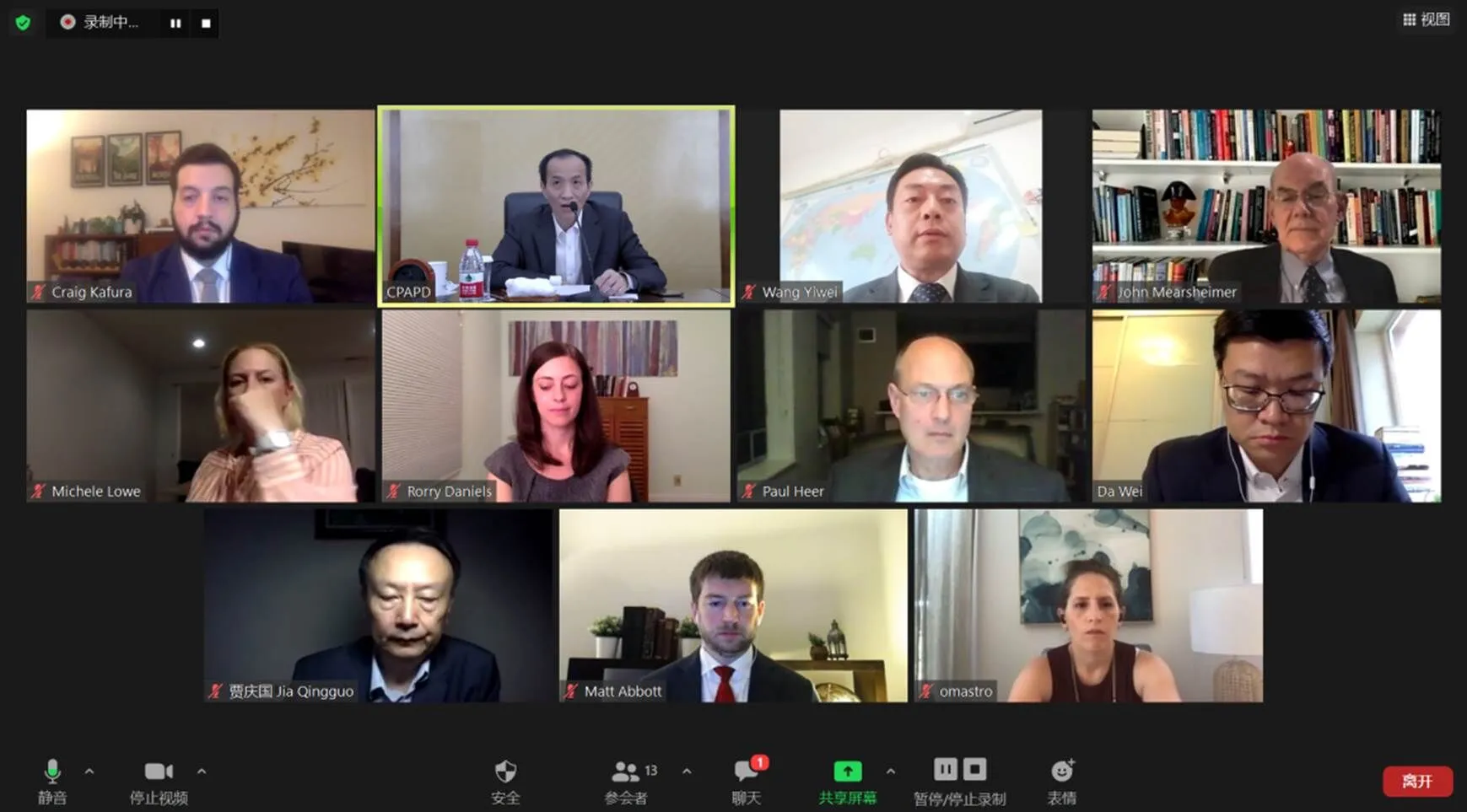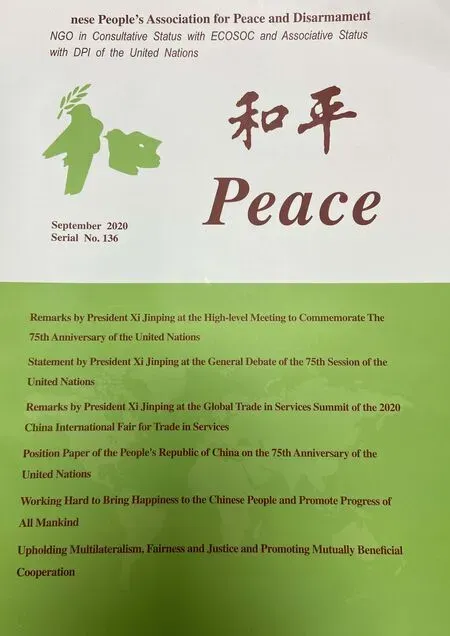CPAPD International Exchanges
CPAPD International Exchanges
Briefings about the First Online Dialogue on China-US relations
On 14th July, the Chinese People’s Association for Peace and Disarmament, the American Friends Service Committee and the United States Institute of Peace, co-hosted the first online dialogue on China-US relations. More than 20 scholars and other participants from various institutes and the 3 co-hosts attended the dialogue. The US scholars are mainly from the CSIS, CFR, AEI and Georgetown University, and the Chinese scholars from China Foreign Affairs University, Fudan University, Nanjing University and Charhar Institute. The deputy secretary general of the CPAPD, Mr. Taotao participated the dialogue and contributed in speeches. Scholars and participants attended exchanged views and ideas toward the current China-US relations in a candid and lively manner, producing substantial results.
Participants argued that the world is undergoing unprecedented changes, and the COVID-19 is a historical event once in a century. When the great pandemic coincides with the great changes, the international order will accelerate the pace of profound and complex changes. China and the US are two major countries of global importance, and the China-US relations have become the key elements to influence the progress of the future world landscape.
Participants contended that the China-US relations are experiencing an important historical moment and standing at a critical crossroads. The China-US relations are with many challenges at the moment. As China and the US are important pillars to the current international system, a sound China-US relationship is also conducive to world peace and prosperity. It is a pity if the China-US relations plunge into a situation of increasing confrontation, escalating conflicts and consuming each other. It is the shared hope that the China-US relations can return to the track of cooperation as soon as possible.
Participants pointed out that both China and the US benefit from cooperation and suffer from confrontation. Cooperation is the only solution for both sides. As China is the largest developing country, the US the largest developed country, and both represent two major economies in the world, China and the US have so much to play in jointly addressing global challenges. Given the solid social foundation for China-US friendship, it is important for both countries to share views and increase mutual understanding when the bilateral relations are at a difficult time.
Participants emphasized that the trend of China-US relations is crucial. After some time of contests and frictions, China and the US may find new path for contacts and exchanges. A new relationship of “coopetition” may be formed, where cooperation remains, while contradictions and disputes are controlled. It is important for both China and the US to face problems in a direct way, seek innovation and changes and explore possible establishment of a functional partnership. It may also be useful if China and the US have more dialogues on global and regional issues, maintaining pragmatic bilateral cooperation in order to achieve the “power-sharing” rather than the “power-shifting” pattern between the two countries.
Participants thought that civil institutions from China and the US may work positively together, giving full play to scholars and experts as policy source and think tanks. It may be easier for both sides to start from the common interests of China and the US, so as to promote the restructuring of a new strategic architecture for bilateral relations. It will bring stability and positive energy to the world full of uncertainty, if both sides can build a China-US relationship based on coordination, cooperation and stability.
Participants gave positive comments on the importance of increasing dialogues between China and US scholars, contending this online dialogue among scholars come just in time. In the backdrop where more challenges to the China-US relations will emerge, it is helpful to conduct dialogues and exchanges among scholars. This kind of dialogues will make good use of the civil institutions, mobilize more positive resources, expand common ground of bilateral cooperation and promote stable development of China-US relations. By inviting more scholars from China, US and other countries to join the dialogue, it will enable the in-depth analysis on problems and challenges in the China-US relations, and the exploration of opportunities on various levels of global, multi-lateral and bilateral cooperation. It is the shared hope among participants that the CPAPD, the AFSC and the USIP will continue to convene series of such online dialogues, which will contribute to the stable development of the China-US relations.
Briefings about the Second Online Dialogue on China-US Relations
On 24th September, the Chinese People’s Association for Peace and Disarmament co-hosted an Online Dialogue on China-US Relations, with the Chicago Council on Global Affairs. Scholars and representatives from the Co-Hosts, the Center for the National Interest, National Committee on American Foreign Policy, University of Chicago, Stanford University, Peking University, Renmin University of China, University of International Relations and Shanghai Institutes for International Studies participated in this Dialogue. Dr. Tao Tao, Deputy Secretary General of the CPAPD attended the meeting and delivered some remarks. Presenting scholars discussed about the current China-US relations and possible reasons beyond it and explored the prospects of China-US relations.

Online Video Conference Successfully Held between the Chinese and Kazakhstan Civil Organizations
During July 14-16, the Chinese People’s Association for Peace and Disarmament and the Kazakhstan Fund of Peace jointly organized an online video conference with the theme as "Belt and Road Construction under the Epidemic". Mr. Shaikh Kazybek, Chairman of the Kazakhstan Fund of Peace, Mr. Baryshev Maxim Anatolyevich, Chairman of the Regional Committee of the Almaty Entrepreneurs Association, Ms. Sadykova Aizhan Begaydarovna, Chairman of the National Medical Association of Kazakhstan, and other representatives of Kazakh civil organizations, and Mr. An Yuejun, Secretary-General of the CPAPD, Ms. Chen Xiaohan, Deputy Secretary-General of the CPAPD, Mr. Tong Xiaolin, Academician of the Chinese Academy of Sciences and Chief Researcher of the Chinese Academy of Chinese Medical Sciences, Mr. Ding Xiaoxing, Director of the Eurasian Institute of the China Institute of Contemproray International Relations, officials from the Department of Commerce and the Office of Foreign Affairs of Xinjiang Autonomous Region, and from Kazakhstan branch of Sinopec International Exploration Company and other Chinese participants attended the event. The two sides conducted in-depth exchanges on the practices and experience of the two countries in cooperating to fight the epidemic, jointly advancing the construction of the "Belt and Road" projects under the epidemic, and exchanges between the two organizations.
The CPAPD Holds Webinar for Leaders of Peace Organizations and Scholars of Security Think Tanks in Developing Countries
During the first half of September, the CPAPD held a webinar for leaders of peace organizations and scholars from think tanks in developing countries with the theme of "Building a Community of Shared Future for Neighboring Countries in the Context of the Epidemic". More than 40 officials, leaders of peace organizations and scholars of think tanks from Nepal, Sri Lanka and Pakistan participated in the webinar. Dr. Tao Tao, Deputy Secretary General of the CPAPD, attended the webinar and made introduction on "working together to build a community of shared future for neighboring countriesby pooling civilian wisdom". Dr. Liang Jinjun, Director of International Exchange and Cooperation Office and Chief Physician of Cardiovascular Department in Renmin Hospital of Wuhan University, and Dr. Wang Shida, Deputy Director of the Institute ofSouth Asian Studies at the China Institutes of Contemporary International Relations, respectively introduced the Chinese experience and practice inepidemic prevention and control and international cooperation against COVID-19, as well as the security situation in South Asia. The CPAPD had in-depth exchanges with panelists on issues such as the epidemic situation in South Asia, regional security situation, and BRI cooperation etc.

- Peace的其它文章
- Sharing Thick and Thin Calling for Unity and Cooperation
- WHO Secretary-General Tedros Adhanom Puts Forward Four Suggestions To Restart Economic and Social Life
- Message on the International Day of Peace From UN Secretary-General Antonio Guterres
- Upholding Multilateralism, Fairness and Justice and Promoting Mutually Beneficial Cooperation---Keynote Speech by State Councilor and Foreign Minister Wang Yi At the International Seminar on Global Digital Governance
- Working Hard To Bring Happiness to the Chinese People and Promote Progress of All Mankind
- Remarks by H.E. Xi Jinping President of the People's Republic of China At the Global Trade in Services Summit of The 2020 China International Fair for Trade in Services

